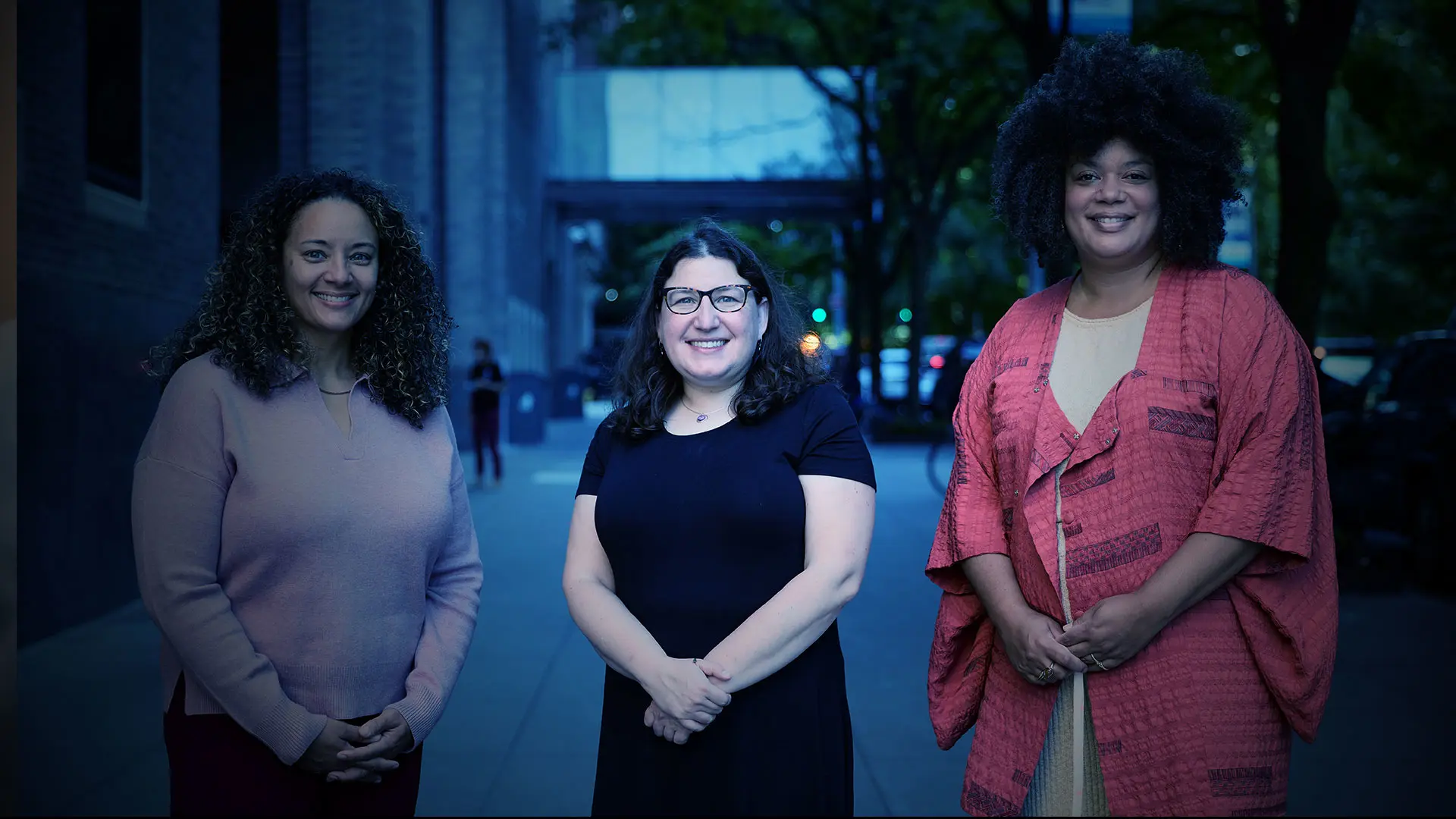“Every lab has its own culture, which is set by the principal investigator, and each investigator comes from a different department within a different multidisciplinary training area within the school,” says Dr. Swartz, who is also Director of Mount Sinai’s MD/PhD program, and Associate Professor of Medicine (Infectious Diseases), and Medical Education. “That heterogeneity can be very isolating for anyone with a marginalized identity because there are not many people who can understand exactly what you are going through from your identity perspective. As a result, individuals with one or multiple intersecting marginalized identities may feel less supported from a mentorship or programmatic perspective.”
Dr. Swartz is collaborating with colleagues in leading a substantive effort, known as the Graduate Racism and Bias Initiative (gRBI), to change that.
The effort is being led by the new Center for Anti-racism in Practice.

From left: Ann-Gel Palermo, DrPH; Talia Swartz, MD, PhD; and Leona Hess, PhD, MSW
The Center for Anti-racism in Practice (CAP) is a newly launched initiative to expand the scope of the 2017 rollout of a culture transformation initiative at Icahn Mount Sinai to eliminate racism and bias from its medical education program. Leona Hess, PhD, MSW, Founder and Co-Director of CAP, and CAP Co-Director Ann-Gel Palermo, DrPH, Senior Associate Dean for Diversity, Equity, and Inclusion, Associate Professor of Medical Education, and Assistant Professor of Pediatrics, have been working to formally integrate antiracism efforts across both the School of Medicine and the Graduate School of Biomedical Sciences.
“We saw this as an opportunity to take the lessons learned and work with the Graduate School to implement a similar initiative, but in a way that reflects the distinct context and culture of graduate biomedical education and training,” says Dr. Palermo. “CAP decided Dr. Swartz should champion this effort at the Graduate School, and we worked with leadership to develop a strategy to establish the necessary structures to address racism and bias.”
The gRBI initiative reflects the distinct context and culture of graduate biomedical education and training.
– Ann-Gel Palermo, DrPH
The first step is a deep dive into understanding the culture and climate of the Graduate School through Data Walks. Through this innovative approach to data sharing, the entire Graduate School community has an opportunity to provide real-time feedback and reveal their own experiences, an effort aimed at achieving a shared understanding of racism and bias at the school. In this way, Dr. Swartz says, direction on change targets is co-created with key stakeholders as opposed to a top-down approach. Informed by multiple data sources, including baseline, exit, and annual student and postdoc surveys, the Data Walks will depict the experiences of students, faculty, staff, and postdoctoral trainees, and promote robust community in-person and virtual discussion.“
The experiences could be someone who was misgendered, someone who faced challenges in accessing career development as an immigrant, or someone who felt unsupported by a mentor in terms of feedback,” Dr. Swartz explains. “Participants can engage with those examples, reflect on them, and offer feedback on what they think needs to be done to disrupt the ways inequities are perpetuated intentionally or otherwise.” The virtual Data Walks will allow participants to record their reactions to these experiences alongside the reactions of in-person attendees via an electronic platform.

The first in-person and virtual Data Walks took place in December 2022.
Feedback from participants will be synthesized and analyzed by a guiding coalition that includes Dr. Palermo, Dr. Hess, and Dr. Swartz to identify root causes of the inequities experienced. The results will be presented to the Graduate School leadership for their input, at which point the coalition will identify change targets and then work with stakeholders to implement changes. It will be a methodical, steady approach that will require engagement with many different stakeholders to achieve meaningful cultural change. To facilitate that effort, Dr. Hess is working to build the capacity of coalition members to learn from each other, assess outcomes, and be responsive to a complex, adaptive, living system.
“It is challenging to talk about hoped-for outcomes because we do not know what the changes will be at this point,” Dr. Hess says. “That said, I would like to see a thriving guiding coalition that understands the landscape of the Graduate School, breaks down silos, and addresses some of the power structures, mental models, and inequities that need to change. I am really excited to see what emerges from this initiative.”
I would like to see a thriving guiding coalition that understands the landscape of the Graduate School, breaks down silos, and addresses some of the power structures, mental models, and inequities that need to change.
– Leona Hess, PhD, MSW
For Dr. Swartz, it is important that the processes, changes, and milestones are visible and transparent, and that there is accountability at every step. She believes the ultimate success of the initiative will be determined by factors such as whether people feel empowered to share their perspectives and enhanced equity in accessing career and mentoring opportunities. She also believes this is, and will remain, an iterative process, and the definition of success will evolve.
The disparities are deep-seated and structural and are not going to be fixed tomorrow. If we accept that this will not be easy and give ourselves grace, I believe it will be possible to follow through on this.
– Talia Swartz, MD, PhD
“The disparities that we're addressing are deep-seated and structural,” Dr. Swartz says. “They're not going to be fixed tomorrow, and we may get some things wrong along the way. If we accept that this will not be easy and give ourselves grace, I believe it will be possible to follow through on this.”
